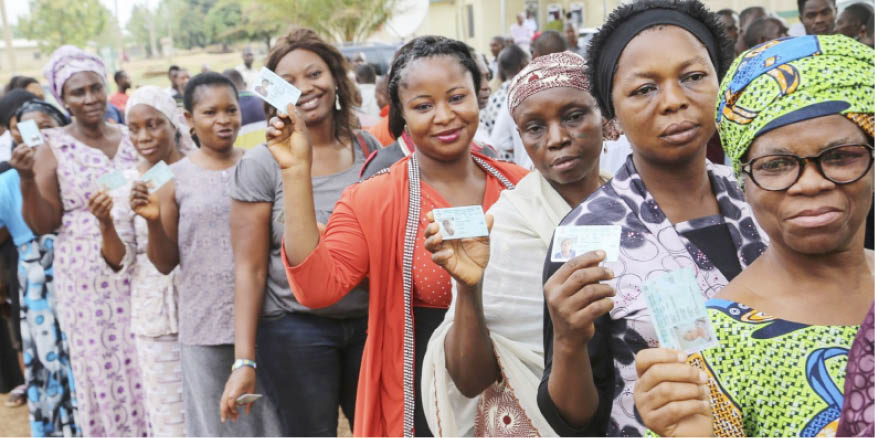Interrogating ethnic syndicates and political endorsement
Their newest game in town is political endorsements. In the runner-up to the 2019 elections, ethnic syndicates acting in the names but certainly not on behalf of our ethnic nationalities are on the political prowl. What some reports called “leaders and elders of all geopolitical zones,” gathered recently to endorse a particular presidential candidate of […]

Electorates showing their PVCs and ready to vote
Their newest game in town is political endorsements.
In the runner-up to the 2019 elections, ethnic syndicates acting in the names but certainly not on behalf of our ethnic nationalities are on the political prowl.
What some reports called “leaders and elders of all geopolitical zones,” gathered recently to endorse a particular presidential candidate of the opposition as their choice. While no one would challenge the leaders and elders for their choice, it is certainly beyond them to do so on behalf of any ethnic nationality in Nigeria, since there is no mechanism by which they are established as been in representation or consultation with any ethnic nationality group.
Beyond the nebulous status of the “leaders and elders”, which is clearly deficient in both representation and consultation, the politics of endorsement is past its time, especially in the era, when votes are reckoned to count. In the past ignominious era of vote allocations, the perceptions of geo-political support and endorsement could attract block vote allocations, translating automatically to electoral advantage and prospective victory. But this is certainly not anymore. Any politician relying on group endorsement and support certainly has not accommodated himself or herself to the sea-change of electoral politics brought by the revolutionary and game-changing “permanent voters card, (PVC). The simple implication of the PVC and the consequence that vote counts, is that political middleman-ship is as obsolete as multiple voting by proxy, when voters cards are bought, hoarded and issued to paid agents to vote as many time as it was possible then, and group political endorsement does the magic of covering up and rationalizing brazenly stolen polls and other electoral infractions.
While issues in electoral politics here are not yet sharp and clearly discernible, electoral success in the ballot is now certainly based on direct appeal to voters than engaging ethnic syndicates or other political middlemen.
The new confidence of the individual voter that his or her vote counts and that he or she, therefore, has some measure of influence in the electoral outcomes, makes the voter all the more independent against past practice where the feelings of helplessness, impels the voter to dissolve into identity group.
All these, does not mean that the electoral process has reached an Eldorado and are no longer beyond manipulations and distortions, but it has certainly reached a critical mileage beyond the previously electoral sham of votes allocation and other backhand deals, surreptitiously reached, even before elections are held. In the era, when voting was actually a ritual meant to give a veneer of legitimacy to election results written, behind the back of voters, electoral politics is essentially bargains among influential ethnic and religious groups and even front organizations of political entrepreneurs, but certainly, not anymore in the strict sense.
However, nothing in this analysis suggests that organized groups lack influence on the political and even electoral choice of voters, but such influence rest on the extent to which such groups articulate issues, voters are discernibly interested and which have reasonably direct impacts on their well being. But the way, voters are influenced by groups is by articulating issues of their concerns and not by rail-loading by the excessive brinkmanship of political endorsement.
The perception that political endorsements are chiefly transactional, involving cash payments or political I.O.U.s to be paid off in political appointments, contract awards, means that in the era of the new found confidence of the voters can actually boomerang, especially if the voter feels that his or her votes are being traded behind his or her back.
The fact is that political endorsement can actually be counterproductive, especially when done by ethnic syndicates, fronting the name of ethnic nationality which was neither consulted nor has delegated any group through any verifiable mechanism of democratic consultation to act on its behalf.
However, while hardcore political party members and supporters spread across all ethnic nationalities are more likely to treat political endorsements with either enthusiasm or disdain, the generality of the free-floating voters, far more numerous in number are likely to treat endorsement as affronts to their sense of political judgments, which are ever maturing with the passage of time and improvement in the electoral process.
The old style of electoral politics, including political endorsement, may not simply vanish, but their viability as critical inputs to electoral success leave much to be desired in any scientific interrogation of our contemporary politics.
Symbolism of group political endorsement might inflate political ego, but critical changes in the contemporary political process make ego tripping, an unworthy act, totally deficient of any electoral value.
Mr. Onunaiju, writes from Utako, Abuja.
